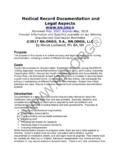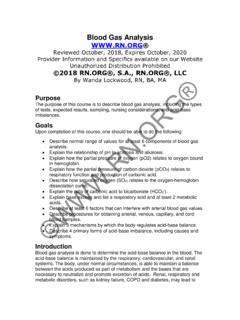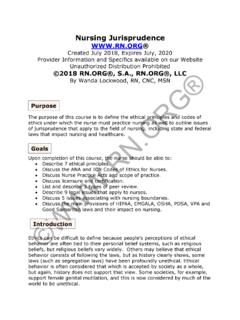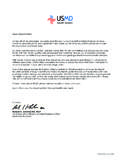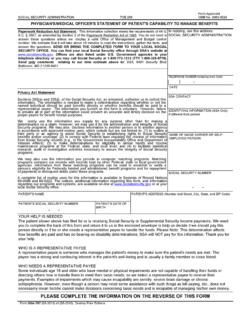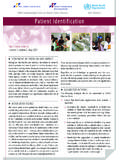Transcription of Patient Rights and Responsibilities - - RN.org®
1 Patient s Rights and Responsibilities Reviewed May, 2016, Expires May, 2018 Provider Information and Specifics available on our Website Unauthorized Distribution Prohibited 2016 , , , LLC By Melissa K Slate, RN, BA, MA Objectives By the end of this educational encounter, the clinician will be able to: 1. Identify basic Patient Rights 2. Relate how Patient Rights impact daily nursing practice 3. Apply principles of Patient Rights to personal nursing practice Introduction The purpose of this educational offering is to give the clinician a basic, working knowledge of the principles involving Patient Rights .
2 Patient Rights encompasses legal and ethical issues between the Patient and the health care provider that include the Patient s right to quality health care which is without bias, the right to privacy, and the right to information enabling informed decision making regarding treatment choices. The American Hospital Association first adopted a Patient s Bill of Rights in 1973 to ensure that hospitals were sensitive to the needs of patients in the areas of race, religion, ethic background, linguistics, age, and gender as well as the needs of persons with disabilities.
3 The American Hospital Association further went on to add that the Rights of the Patient could be exercised by a health care proxy in the event that the Patient was unable to exercise his own Rights . 1. The Patient has the right to considerate and respectful care. 2. The Patient has the right to and is encouraged to obtain from physicians and other direct caregivers relevant, current, and understandable information concerning diagnosis, treatment, and prognosis. Except in emergencies when the Patient lacks decision-making capacity and the need for treatment is urgent, the Patient is entitled to the opportunity to discuss and request information related to the specific procedures and/or treatments, the risks involved, the possible length of recuperation, and the medically reasonable alternatives and their accompanying risks and benefits.
4 patients have the right to know the identity of physicians, nurses, and others involved in their care, as well as when those involved are students, residents, or other trainees. The Patient also has the right to know the immediate and long-term financial implications of treatment choices, insofar as they are known. 3. The Patient has the right to make decisions about the plan of care prior to and during the course of treatment and to refuse a recommended treatment or plan of care to the extent permitted by law and hospital policy and to be informed of the medical consequences of this action.
5 In case of such refusal, the Patient is entitled to other appropriate care and services that the hospital provides or transfer to another hospital. The hospital should notify patients of any policy that might affect Patient choice within the institution. 4. The Patient has the right to have an advance directive (such as a living will, health care proxy, or durable power of attorney for health care) concerning treatment or designating a surrogate decision maker with the expectation that the hospital will honor the intent of that directive to the extent permitted by law and hospital policy.
6 Health care institutions must advise patients of their Rights under state law and hospital policy to make informed medical choices, ask if the Patient has an advance directive, and include that information in Patient records. The Patient has the right to timely information about hospital policy that may limit its ability to implement fully a legally valid advance directive. 5. The Patient has the right to every consideration of privacy. Case discussion, consultation, examination, and treatment should be conducted so as to protect each Patient 's privacy.
7 6. The Patient has the right to expect that all communications and records pertaining to his/her care will be treated as confidential by the hospital, except in cases such as suspected abuse and public health hazards when reporting is permitted or required by law. The Patient has the right to expect that the hospital will emphasize the confidentiality of this information when it releases it to any other parties entitled to review information in these records. 7. The Patient has the right to review the records pertaining to his/her medical care and to have the information explained or interpreted as necessary, except when restricted by law.
8 8. The Patient has the right to expect that, within its capacity and policies, a hospital will make reasonable response to the request of a Patient for appropriate and medically indicated care and services. The hospital must provide evaluation, service, and/or referral as indicated by the urgency of the case. When medically appropriate and legally permissible, or when a Patient has so requested, a Patient may be transferred to another facility. The institution to which the Patient is to be transferred must first have accepted the Patient for transfer.
9 The Patient must also have the benefit of complete information and explanation concerning the need for, risks, benefits, and alternatives to such a transfer. 9. The Patient has the right to ask and be informed of the existence of business relationships among the hospital, educational institutions, other health care providers, or payers that may influence the Patient 's treatment and care. 10. The Patient has the right to consent to or decline to participate in proposed research studies or human experimentation affecting care and treatment or requiring direct Patient involvement, and to have those studies fully explained prior to consent.
10 A Patient who declines to participate in research or experimentation is entitled to the most effective care that the hospital can otherwise provide. 11. The Patient has the right to expect reasonable continuity of care when appropriate and to be informed by physicians and other caregivers of available and realistic Patient care options when hospital care is no longer appropriate. 12. The Patient has the right to be informed of hospital policies and practices that relate to Patient care, treatment, and Responsibilities . The Patient has the right to be informed of available resources for resolving disputes, grievances, and conflicts, such as ethics committees, Patient representatives, or other mechanisms available in the institution.
